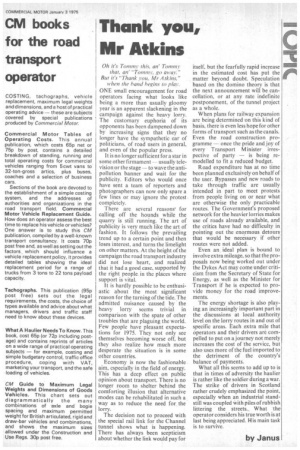Thank you, Mr Atkins
Page 37

If you've noticed an error in this article please click here to report it so we can fix it.
Oh it's Tomn7y this, an' Tommy that, an' "Tommt., go away.Rut it's "Thank you, Mr Atkins," when the band begins to plat'.
ONE small encouragement for road operators facing what looks like being a more than usually gloomy year is an apparent slackening in the campaign against the heavy lorry. The customary euphoria of its opponents has been dampened down by increasing signs that they no longer have the sympathetic ear of politicians, of road users in general, and even of the popular press.
It is no longer sufficient for a star in some other firmament — usually tele: vision or the stage — to wave the antipollution banner and wait for the publicity. Editors who would once have sent a team of reporters and photographers can now only spare a few lines or may ignore the protest completely.
There are several reasons' for calling off the hounds while the quarry is still running. The art of publicity is very much like the art of fashion. It follows the prevailing trend up to a certain point and then loses interest, and turns the limelight on other matters. At the height of the campaign the road transport industry did not lose heart, and realized that it had a good case, supported by the right people in the places where support is vital.
It is hardly possible to be enthusiastic about the most significant reason for the turning of the tide. The admitted nuisance caused by the heavy lorry seems trivial in comparison with the spate of other troubles that are plaguing the world. Few people have pleasant expectations for 1975. They not only see themselves becoming worse off, but they also realize how much more desperate the situation is in some other countries.
Economy is now the fashionable aim, especially in the field of energy. This has a deep effect on public opinion about transport. There is no longer room to shelter behind the comforting illusion that alternative modes can be rehabilitated in such a way as to reduce the need for the lorry.
The decision not to proceed with the special rail link for the Channel tunnel shows what is happening. There has always been scepticism about whether the link would pay for itself, but the fearfully rapid increase in the estimated cost has put the matter beyond doubt. Speculation based on the domino theory is that the next announcement will be cancellation, or at any rate indefinite postponement, of the tunnel project as a whole.
When plans for railway expansion are being determined on this kind of basis, there is even less hope for other forms of transport such as the canals.
Even the road construction programme — once the pride and joy of every Transport Minister irrespective of party — is being remodelled to fit a reduced budget.
Road expenditure has at no time been planned exclusively on behalf of the user. Bypasses and new roads to take through traffic are usually intended in part to meet protests from people living on or near what are otherwise the only practicable routes. The Government's proposed network for the heavier lorries makes use of roads already available, and the critics have had no difficulty in pointing out the enormous detours. that would be necessary if other routes were not added.
Even an ideal plan is bound to involve extra mileage, so that the pro posals now being worked out under the Dykes Act may come under criticism from the Secretary of State for Energy, as well as the Minister for Transport if he is expected to provide money for the road improvements.
The energy shortage is also playing an increasingly important part in the discussions at local authority level on the lorry routes in and out of specific areas. Each extra mile that operators and their drivers are com pelled to put on a journey not merely increases the cost of the service, but also uses more of the fuel imported to the detriment of the country's balance of payments.
What all this seems to add up to is that in times of adversity the haulier is rather like the soldier during a war.
The strike of drivers in Scotland rather crudely emphasized the point, especially when an industrial stand still was coupled with piles of rubbish littering the streets. What the operator considers his true worth is at last being appreciated. His main task is to survive.
by Janus












































































